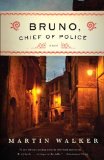Summary | Excerpt | Reviews | Beyond the Book | Readalikes | Genres & Themes | Author Bio

Bruno’s gun, a rather elderly MAB 9mm semiautomatic, was locked in his office safe in the Mairie, and in recent years he had taken it out only for his annual refresher course at the gendarmerie range in Périgueux. He had worn it on duty on only three occasions in his ten years in the Police Municipale. The first was when a rabid dog had been sighted in a neighboring commune, and the police were put on alert. The second was when the president of France had driven through St. Denis on his way to see the celebrated cave paintings of Lascaux nearby; he had stopped to visit an old friend, Gérard Mangin, who was the mayor of St. Denis and Bruno’s employer. The third time was when a boxing kangaroo escaped from a local circus. On no occasion had Bruno’s gun ever been used on duty, a fact of which he was extremely but privately proud. Of course, like most of the other men (and not a few women) of St. Denis, he shot almost daily in the hunting season and usually bagged his target, unless he was stalking the notoriously elusive bécasse, a bird whose taste he preferred above all others. Bruno gazed contentedly down upon his town in the freshness of the early morning. His eyes lingered on the way the sunlight bounced and flickered off the eddies where the Vézère River ran under the arches of the old stone bridge.The place was alive with light, flashes of gold and red, as the sun magically concocted prisms in the grass beneath the willows and danced along the honey-colored façades of the ancient buildings along the river. There were glints from the weathercock on the church spire and from the eagle atop the town’s war memorial, where Bruno would later that day attend one of the ceremonies that punctuated the nation’s year.
All looked peaceful as the business of the day began, with the first customers heading under the crimson awning into Fauquet’s café, tucked into the alley beside the Mairie. Even from this high above the town he could hear the grating sound of the metal grille being raised to open Lespinasse’s tabac, which sold fishing rods, guns, and ammunition alongside the cigarettes. Bruno knew without looking that, while Madame Lespinasse was opening the shop, her husband would be heading to the café for the first of many little glasses of white wine that would keep him pleasantly lubricated until lunch.
From the secretaries and social workers to the street sweepers and tax assessors, the staff of the Mairie would also be at Fauquet’s, nibbling their croissants and taking their coffee at the long zinc bar, eying the tartes aux citron and the millefeuilles they might take home for lunch along with the essential baguette of fresh bread and scanning the headlines of that morning’s Sud Ouest. Alongside them would be a knot of old men studying the racing form and enjoying their first petit blanc of the day. Bachelot the shoemaker would take his morning glass there, while the neighbor he despised, Jean-Pierre, who ran the bicycle shop, would start his day at the Café de la Libération. Their enmity went back to the days of the Resistance, when one of them had been in a communist group and the other had joined de Gaulle’s Armée Secrète, but Bruno could not reliably remember which had been in which. He only knew that they had not spoken to one another since the war, had never allowed their families to speak beyond the frostiest “Bonjour,” and each man had devoted many of the years since to subtle but determined efforts to seduce the other man’s wife. The mayor had once confided his conviction that each had attained his objective. Bruno, as a careful guardian of his own privacy in such tender matters, was content to allow others similar latitude. He enjoyed the continuity these morning movements represented. They were rituals to be respected—rituals such as the devotion with which each family bought its daily bread only at a particular one of the town’s four bakeries, except on those weeks of holidays when they were forced to patronize another, each time lamenting the change in taste and texture. These little ways of St. Denis were as familiar to Bruno as his own morning routine on rising in his old shepherd’s cottage in the hills above the town: his exercises while listening to Radio Périgord, his shower with a special shampoo to protect against the threat of baldness, the soap with the scent of green apples. Then he would feed his chickens while the coffee brewed and share toasted slices of yesterday’s baguette with his dog, Gigi.
Excerpted from Bruno, Chief of Police by Martin Walker Copyright © 2009 by Martin Walker. Excerpted by permission of Knopf, a division of Random House, Inc. All rights reserved. No part of this excerpt may be reproduced or reprinted without permission in writing from the publisher.
Your guide toexceptional books
BookBrowse seeks out and recommends the best in contemporary fiction and nonfiction—books that not only engage and entertain but also deepen our understanding of ourselves and the world around us.